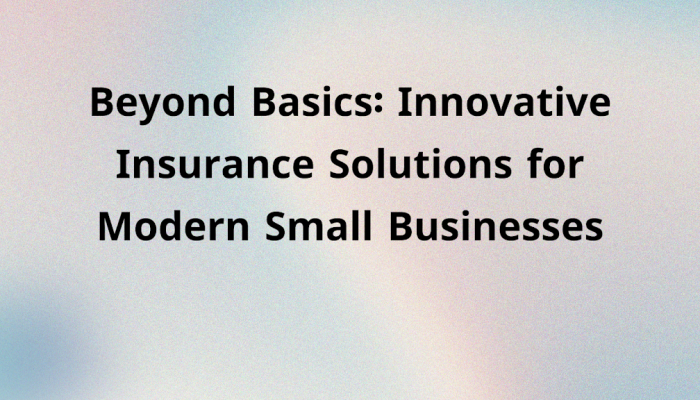In today’s dynamic business environment, small enterprises face a myriad of challenges, from fierce competition to rapid technological advancements. As these challenges evolve, so too must the solutions that businesses adopt to protect themselves. Insurance, once viewed as a basic necessity, is now becoming a sophisticated tool designed to address the unique risks and opportunities of modern small businesses. This guide explores the innovative insurance solutions that are reshaping how entrepreneurs safeguard their ventures.
Embracing Cyber Liability Insurance
In an era where data breaches and cyberattacks are increasingly common, cyber liability insurance has emerged as a critical component of a business’s risk management strategy. Traditional insurance policies often fail to cover the complex and evolving risks associated with digital threats. Cyber liability insurance goes beyond basic coverage, offering protection against a range of cyber risks including data breaches, network security failures, and cyber extortion.
For small businesses, the cost of a cyber incident can be devastating, not only in terms of immediate financial loss but also due to long-term reputational damage. Cyber liability insurance typically covers expenses related to data recovery, legal fees, and notification costs to affected parties. Additionally, it may include access to a network of cybersecurity experts to help mitigate damage and prevent future attacks. As businesses increasingly rely on digital platforms and handle sensitive customer information, cyber liability insurance is becoming indispensable.
Exploring Business Interruption Insurance
While many are familiar with standard property and casualty insurance, business interruption insurance is often overlooked. This type of coverage is designed to protect businesses from loss of income due to unforeseen disruptions. Traditional policies might cover property damage, but they do not always address the financial impact of a shutdown or operational halt.
Business interruption insurance provides a safety net by covering lost income during periods when the business is unable to operate due to covered events such as natural disasters, fire, or even pandemics. This can be particularly beneficial for small businesses that rely heavily on physical locations or have a limited financial cushion. Innovative policies in this space are now offering extended coverage options, including loss of income due to supply chain disruptions and remote work-related interruptions.
Leveraging Professional Liability Insurance
For small businesses that offer specialized services or advice, professional liability insurance (also known as errors and omissions insurance) is crucial. Unlike general liability insurance, which covers bodily injury and property damage, professional liability insurance focuses on risks associated with the professional services provided.
In the modern business landscape, where services range from consultancy to digital marketing, the potential for errors or omissions that could lead to financial loss for clients is significant. Professional liability insurance helps cover the cost of legal defense, settlements, and damages resulting from claims of negligence, misrepresentation, or failure to perform. As businesses increasingly operate in a global marketplace, the scope and complexity of such coverage are expanding to address new and evolving risks.
Adopting On-Demand and Micro Insurance
The traditional approach to insurance, with its long-term commitments and extensive paperwork, often doesn’t align with the fast-paced nature of today’s business world. In response, on-demand and micro insurance solutions are gaining traction. These innovative products allow small business owners to purchase coverage for specific risks on a short-term basis, offering flexibility and cost efficiency.
On-demand insurance is particularly useful for businesses with fluctuating needs or those that require coverage for temporary projects or events. For instance, a company hosting a special event or running a seasonal promotion might opt for short-term coverage that aligns with their temporary risk exposure. Micro insurance, on the other hand, offers bite-sized policies that can be tailored to very specific risks, making it a viable option for startups and small enterprises seeking targeted protection without committing to extensive coverage.
Exploring Industry-Specific Coverage
As industries evolve, so do the risks associated with them. Industry-specific insurance products are designed to address the unique challenges faced by businesses in various sectors. For example, the rise of the gig economy has led to the development of insurance solutions tailored for freelancers and independent contractors. Similarly, the growth of the sharing economy has prompted insurers to create coverage options for businesses operating within this space.
From insurance for tech startups to coverage for green businesses focused on sustainability, industry-specific insurance solutions are becoming more sophisticated and tailored. These policies not only address the general risks associated with running a business but also take into account the specific regulatory requirements and operational challenges of different sectors.
Integrating Insurance with Business Strategy
Innovative insurance solutions are not just about purchasing the right coverage; they are also about integrating insurance with overall business strategy. Modern small businesses are increasingly viewing insurance as a strategic tool rather than a mere safety net. This involves working closely with insurance providers to customize coverage based on the business’s unique risks and goals.
For instance, a business involved in international trade might work with insurers to develop a comprehensive risk management plan that includes global liability coverage and international property insurance. Similarly, businesses with complex supply chains might collaborate with insurers to address risks related to supplier disruptions and logistics challenges. By aligning insurance coverage with business strategy, small enterprises can better manage their risks and seize opportunities for growth.
Conclusion
As the business landscape continues to evolve, so too must the approaches to managing risk. Innovative insurance solutions are transforming how small businesses protect themselves, offering more tailored and flexible options than ever before. From cyber liability and business interruption insurance to on-demand coverage and industry-specific policies, the array of options available today provides small business owners with the tools they need to navigate an increasingly complex world. By embracing these advanced insurance solutions and integrating them into their overall business strategy, modern entrepreneurs can not only safeguard their ventures but also position themselves for long-term success.


